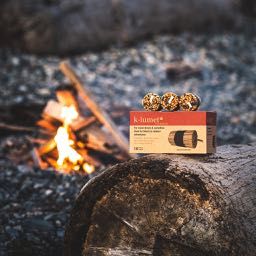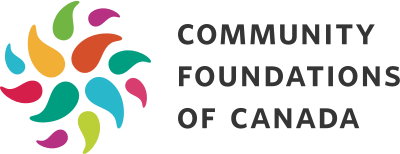This is part of our Investment Readiness Program series, showcasing how IRP funding is helping social purpose organizations prepare for investment while continuing to have a positive impact on their communities.
Based in the coastal community of Powell River, British Columbia, K-Lumet is a social enterprise and manufacturing facility, providing inclusive employment for people with diverse abilities. Its product? A firestarter made from 99% recycled materials. As a recipient of the 2020 Investment Readiness Program (IRP), K-Lumet has received funding to help secure future investors and grow the business.
The company first started in Switzerland in the 1990s, and has since expanded to other European countries. In 2013, Barbarah Kisschowsky, a resident of Texada Island, B.C., licensed K-Lumet for Canadian franchise. “Barbarah’s son is profoundly impacted by disability,” explains Leni Goggins, K-Lumet’s project manager. “She was struggling to find suitable employment options for him.”

In Europe, K-Lumet is set up as a supervised workplace exclusively hiring adults with disabilities. “People are often paid below minimum wage, and this is usually done through subsidy in most European countries,” says Goggins. “In Canada, we’ve [opted for a more] inclusive model of employment.”
Kisschowsky hired Goggins in 2017 to help launch the K-Lumet pilot project. “Our job is to determine if this company is sustainable under an inclusive employment model,” Goggins says.
She explains that, while most inclusive employment initiatives ask how they can accommodate people with disabilities, “we’re doing the opposite. We have a business, and it’s set up for people with intellectual disabilities. We’re saying, ‘How can we accommodate people who do not have disabilities?’”
As for the K-Lumet firestarter, it’s made from wood cut-offs from construction sites, cuffs from recycled tissue paper roll, and rendered wax. “We collect wax through second-hand stores, and we have recycling receptacles at various locations where the community can bring their tissue paper rolls, their wax,” Goggins says.
K-Lumet has the license to franchise its manufacturing operations across B.C. “People with disabilities are far more likely to have never worked, especially people with intellectual disabilities,” says Goggins. In Canada, statistics show that, of the population of unemployed people living with disabilities, two in five have the potential to work. “It is a large population of people who are being left out of the labour market because of the system. For K-Lumet to succeed has taken system change on every level necessary.”
K-Lumet Receives $14,410 to Get Investment Ready
By expanding its inclusive employment model to new locations, K-Lumet will reduce inequalities and lift up B.C.’s communities. However, to franchise, the business needs additional funding. “Our long-term goal is to be self-sustaining without grants,” Goggins says.
To support the journey to financial resiliency, K-Lumet received $14,410 in IRP funding. The IRP’s aim is to help businesses become investment ready. As a pilot project, K-Lumet needs to prove to investors that it can become profitable, and one way to show that is through a robust business plan. K-Lumet is using the IRP funding to create this plan. “We are a startup, and we’re trying to establish our cost of goods, sales markets, our branding,” explains Goggins.
“The IRP funding is to support us in hiring a consultant who is an expert in social enterprise, but also our type of business. For us to have a basic business plan is going to be absolutely essential for us to move forward with how we can scale out.”
Goggins adds that, for social enterprises, finding investments can be particularly difficult — “investment that sees the value of the social impact, as well as the fiscal return. I’m very, very happy that the IRP came forward, because they’re going to give us the time that we need to determine how to gain investment.”
Reflecting on the IRP application process, Goggins says, “Our chance of getting the IRP was very slim. I think the reason that we got it was because they could see that we have all the partnerships in place, that we have a vision, that we have a goal for scaling out, that we have high social impact.”
K-Lumet’s partners include community living organization, Inclusion Powell River, and the Power River Model Community Project, a non-profit committed to ensuring people with disabilities have equal opportunities.
Looking to the Future
K-Lumet’s future is bright, with plans to increase their recycling services and spin-off new products. “We want to drastically increase the amount of people who are employed,” Goggins says. “We want to continue to sell. Currently our market for sales is North America, and we’re just now starting to receive some very large orders from distributors in Eastern Canada and the United States.”

As a social enterprise, K-Lumet plays an important role in showing how Canada can build back better after COVID-19. “Suddenly people realize that if you buy local, you’re supporting local jobs,” Goggins says. “If you buy from a social enterprise that is supporting social impact, then you are participating in that social impact. In a really interesting turn of events, COVID-19 has made social enterprises much more valid than perhaps they were before.”
Nickie Shobeiry is a writer, TV host and journalist, focusing on stories of social impact and entrepreneurship in Canada and beyond.




